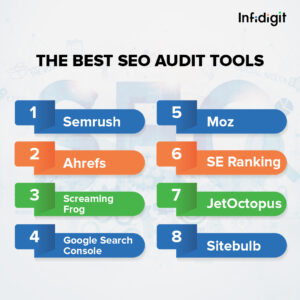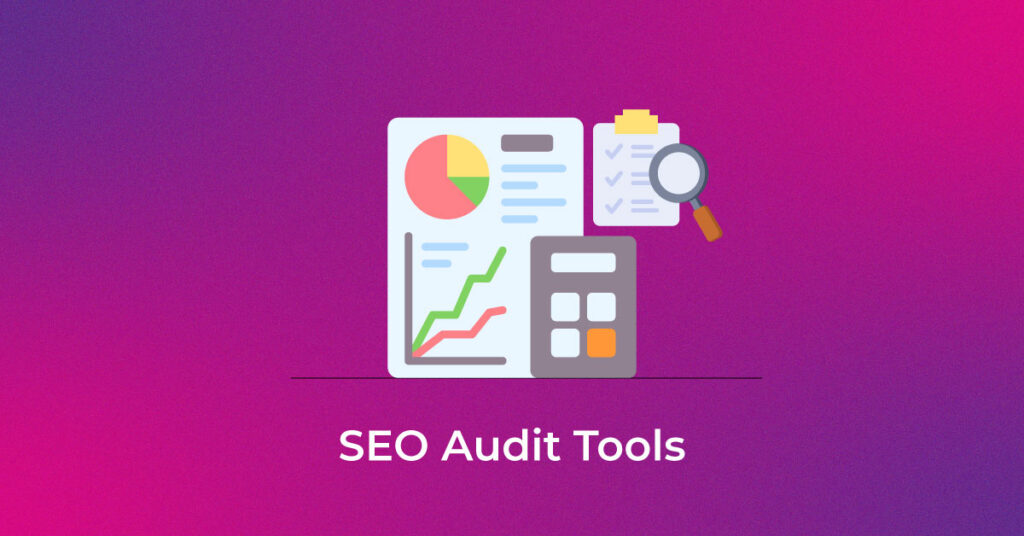Introduction to SEO Audit Tools
Diving into the realm of Search Engine Optimization can often seem like a colossal task with countless aspects to consider. At the heart of optimizing your website and ensuring that it garners the attention it rightfully deserves, lies the necessity of carrying out an SEO audit. This process gives you a bird’s-eye view of where your website stands and what you can do to enhance its performance in search engine rankings.
SEO audit tools are like the keen-eyed detectives of the web world, analyzing your site’s myriad elements and providing critical insights that help you polish and perfect your online presence. A well-conducted audit is the first step in any robust SEO strategy, and the importance of using the right tools for the job cannot be overstated.
What is an SEO Audit Tool?
An SEO audit tool serves as your roadmap to website optimization, examining various components of your site to highlight your strengths and areas for improvement. These tools are essential for diagnosing a website’s health and performance systematically. They provide detailed reports covering technical aspects like site speed and security, content quality, on-page optimization, backlinks, and more. Whether you’re an experienced SEO professional or a beginner, these tools help prioritize improvements and align your site with factors that impact search engine rankings.
Using an SEO audit tool allows you to proactively address issues that may affect your site’s ranking and troubleshoot them effectively. They provide valuable insights into the ever-changing SEO landscape, preparing your website to tackle these challenges head-on.
Importance of SEO Audits for Your Website
SEO audits are vital for your website’s success. Regularly assessing your site’s structure and content provides insights that enhance search engine performance. Here’s why they matter:
- Content Strategy: Audits reveal what works and what doesn’t, helping you optimize content based on traffic-driving keywords.
- Boosting Traffic: They uncover issues that may hinder rankings and help you understand your competitors, enabling informed decisions.
- Identifying Strengths: Audits highlight both weaknesses and successes, allowing you to build on what you do right.
- Staying Updated: With search engines constantly changing algorithms, regular audits ensure your site remains aligned with these updates.
In short, an SEO audit is like a health check-up for your website—don’t leave its well-being to chance.
Criteria for Evaluating the Best SEO Audit Tools
Features to Look For
When you’re in the market for an SEO audit tool, be sure to pick one with a suite of features robust enough to give you a complete analysis of your website’s SEO health. Here’s a spotlight on the primary capabilities you should keep an eye out for:
- Site Explorer: Filter through your URLs easily to pinpoint problems and get an accurate assessment of your site’s performance.
- URL Inspection: Validate if specific URLs have been crawled or indexed and identify any associated issues quickly.
- Site Scan: Detect indexability issues across your site, ensuring all your pages are visible to search engines.
- Comprehensive Crawling: It’s a must to choose a tool that can fully crawl your site, making sure no page, link, or image is missed, which allows for a complete technical error analysis.
- Technical SEO Analysis: Look for a tool that can identify, categorize, and prioritize technical issues such as broken links, duplicate content, missing meta tags, and page speed concerns.
- Actionable Recommendations: A top-notch tool doesn’t just highlight problems; it should also provide clear guidance on how to fix them effectively.
- Backlink Analysis: Gain insights into the quantity and quality of your backlinks, which are vital for your site’s authority and ranking.
- Reporting and Visualization: You’ll want to have clear and concise visual reports that underscore key issues and progress over time.
- Integration with Other Tools: The ability to connect with other essential Google SEO tools like Google Search Console and Google Analytics can amplify your audit efforts and provide a more holistic view of your SEO endeavors. This integration ensures that you have a comprehensive understanding of your website’s performance and allows for better strategic planning.
Select a tool that couples these features with a smooth user experience, and you’ll be well on your way to unlocking your website’s full potential.
User Experience and Interface
The user experience and interface of an SEO audit tool are crucial for its effectiveness. Choose a tool with an intuitive, straightforward interface that doesn’t require extensive training. A clean layout allows easy access to key features, while a dashboard that presents your site’s data clearly highlights areas for improvement and celebrates your SEO successes.
Visual elements like graphs and charts help you quickly identify trends in your site’s performance, enabling swift decision-making based on recent data. Look for a tool that simplifies complex information and avoids jargon, allowing you to focus on improving your website’s SEO with actionable steps.
Ultimately, a great user experience goes beyond aesthetics; it’s about how efficiently the tool helps you reach your goals.
Pricing and Value for Money
Finding an SEO audit tool that offers good value is essential, especially on a budget. Evaluate tools based on these criteria to determine cost-effectiveness:
- Cost-Effectiveness: Compare prices with the quality and range of features. A cheaper tool isn’t always better, and the most expensive isn’t always the most comprehensive.
- Flexible Pricing Tiers: Look for tools with various pricing options that allow you to upgrade or downgrade features as your business needs change.
- Free Versions or Trials: Some tools offer free versions or trial periods, which let you test their capabilities before making a financial commitment.
- No Hidden Costs: Ensure there are no hidden fees or extra charges for essential features like reporting or additional users.
- Discounts and Offers: Many tools provide discounts for annual billing or for non-profits and educational institutions, so watch for deals that can save you money.
- Cost Comparison: Assess tools against competitors; sometimes, a slightly more expensive option can provide better value and efficiency.
Investing in the right SEO audit tool should enhance your site’s performance without straining your budget, ultimately generating a return on your investment.
The Best SEO Audit Tools in 2025

1. Semrush: Comprehensive Site Audits
Semrush stands out among SEO audit tools for its extensive value, offering a comprehensive digital marketing suite with over 40 tools for your online strategy.
- Holistic Analysis: It provides a thorough view of your site’s SEO health, with easy-to-understand audit reports.
- Error Identification and Solutions: Its user-friendly interface highlights errors and offers clear, actionable steps to fix them, serving as a guide for improving your site.
- Largest Backlink Database: Semrush has the largest backlink database, ensuring you catch links that others may miss.
- Comparison Over Time: Easily track your progress by comparing past audits to monitor improvements.
- 140+ Technical SEO Issues: It diagnoses a wide range of technical SEO issues, making it an invaluable tool for perfecting your site’s SEO.
Best for: Enterprises and professionals looking for an all-in-one solution to conduct exhaustive site audits and manage SEO strategy continually.
2. Ahrefs: Technical SEO Analysis
Ahrefs has established itself as a leader in technical SEO analysis, known for its detailed auditing features and insightful data. It’s ideal for those seeking an in-depth understanding of their website’s structure and performance.
- Crawl Depth: Ahrefs thoroughly crawls sites, uncovering issues that might be missed by less comprehensive tools.
- Real-time Data: Its real-time crawl log provides immediate insights into crawling activities, allowing for proactive SEO management.
- Backlink Profile: Ahrefs offers extensive analysis of backlinks, assessing the health of your backlink profile and identifying potentially harmful links.
- Competitor Analysis: The tool allows you to explore competitor analysis of SEO strategies, providing valuable insights for your own site. By understanding what works for your competitors, you can refine your approach and gain a competitive edge in search engine rankings.
Best for: SEO professionals and webmasters who need a detail-oriented tool for in-depth technical analysis and those who regard link building as a cornerstone of their strategy.
3. Screaming Frog: In-Depth Website Crawling
Screaming Frog is a leading tool for in-depth website crawling, highly regarded by SEO professionals for its detailed technical audits. It’s perfect for those who thrive in data-rich environments, breaking down your website into its most intricate components for optimization.
- Extensive Crawling Capacity: It simulates search engine crawling, meticulously checking each URL for insights into your website’s structure and potential issues.
- Spreadsheet-Style Reports: The tool presents data in a spreadsheet format, ideal for users who want to analyze specifics and make bulk edits.
- Robust Feature Set: In addition to standard SEO metrics, it analyzes page titles, meta data, response codes, duplicate content, and generates XML sitemaps.
- Integration with APIs: Screaming Frog integrates with key APIs like Google Analytics, Search Console, and PageSpeed Insights for a more comprehensive audit experience.
Best for: SEO agencies, in-house SEO teams, and web developers who prefer a desktop-based tool for detailed technical SEO insight and are comfortable working with advanced data sets.
4. Google Search Console: Essential Insights
Google Search Console, formerly Google Webmaster Tools, is essential for anyone serious about SEO. It’s a valuable starting point for beginners and remains a go-to resource for experts, providing critical insights directly from Google.
- Direct Feedback from Google: Gain insights into how Google views your site, helping you understand search performance and resolve issues from the source.
- Index Coverage: Monitor which pages are indexed and which aren’t, ensuring maximum visibility in search results.
- Search Performance: Analyze clicks, impressions, average position, and click-through rates for various queries to understand how users find you online.
- Alerts for Issues: Google Search Console proactively alerts you to crawl issues, security concerns, or manual actions that may impact your site’s standing.
Best for: Website owners and SEO beginners who need free, essential tools to monitor their site’s presence in Google search results, as well as professionals for fundamental SEO oversight.
5. Moz: User-Friendly Site Audit Tool
Moz is notable for its user-friendly interface, making SEO audits accessible to beginners and those intimidated by more technical tools. Its Site Crawl feature, part of the Pro toolset, offers a comprehensive examination of your website’s SEO health, focusing on usability alongside detailed data.
- Prioritized Issues: Moz categorizes and prioritizes problems, allowing you to focus on changes that will have the most significant impact first.
- Actionable Insights: The tool provides clear recommendations and resources for resolving issues, making it ideal for users seeking guidance on SEO improvements.
- On-Page Optimization: Moz includes on-page optimization suggestions, offering tailored advice to enhance each page’s relevance for specific keywords.
- User Engagement Metrics: It provides insights into user interaction, helping to improve experiences and boost conversions.
Best for: Small to medium-sized business owners, bloggers, and marketers looking for a comprehensive, easy-to-use SEO tool for regular website audits and improvements.
6. SE Ranking: Balanced Pricing and Features
SE Ranking is recognized for its balance of comprehensive SEO tools and affordability. Its strong audit capabilities and user-friendly features make it a competitive choice for businesses of all sizes seeking to enhance their website performance.
- Clean Data Visualizations: SE Ranking presents data clearly, helping you quickly understand your site’s SEO performance and prioritize actions.
- Flexible Audit Grouping: Customize audits by sorting them into groups, hiding resources, and managing allowed/disallowed URLs to get the specific information you need.
- On-Page and Backlink Audits: The tool offers separate audits for on-page elements and backlinks, ensuring a thorough examination of your site.
- Automated Monitoring and Reporting: Stay informed with regular performance updates through automated monitoring of page changes, keeping you updated on how your adjustments impact SEO.
Best for: Small to mid-sized businesses looking for an all-in-one SEO platform that provides extensive features without a steep learning curve or a top-tier price tag.
7. JetOctopus: Advanced Crawling Capabilities
JetOctopus stands out in the SEO auditing field with its advanced crawling capabilities and high-speed performance analysis. With a decade of experience, it provides not just extensive data but also meaningful insights for technical audits.
- Speed and Efficiency: JetOctopus is designed for quick crawling of large websites, allowing you to identify issues and gather insights in near real time.
- Segment Analysis: It specializes in segment visualization, enabling you to inspect crawl data within specific site sections and quickly access filtered information, like broken links or oversized pages.
- Log File Analyzer: This feature examines live logs to show how search engine bots interact with your site, offering unique insights into technical SEO.
- Backlink Module and GSC Integration: JetOctopus includes backlink analysis and integrates with Google Search Console for a comprehensive view of your site’s search performance.
Best for: Large enterprises and SEO professionals who require an enterprise-level, in-depth technical audit and analysis tool for large, complex websites.
8. Sitebulb: Visual Reports for Better Insights
Sitebulb appeals to users looking for insightful data combined with an engaging visual experience. It delivers detailed audits with a user-friendly interface, making complex SEO data accessible to everyone.
- Intuitive Reporting: Sitebulb features visual reporting that allows users to quickly interpret complex data, highlighting issues and progress in an easily digestible format.
- Exploratory Audits: Available as both a desktop app and cloud-based solution, Sitebulb enables users to conduct exploratory audits conveniently for individual or collaborative use.
- Prioritization Hints: The tool not only identifies issues but also provides prioritized hints, guiding users on where to focus their time and resources.
- Audit Comparisons and History: You can track performance over time, making it easy to see how changes and fixes have impacted your site’s SEO health.
Best for: Marketers and SEO managers, whether in-house or agency-based, who prefer a mix of deep-dive data and comprehensible reports, particularly useful for client presentations.
Best Free SEO Audit Tools
1. Small SEO Tools: Versatile and Accessible
Small SEO Tools is appealing for its versatility and accessibility, allowing users to conduct SEO audits without any financial commitment. With nearly 300 tools, it covers various aspects of website optimization.
- Diverse Utility: The platform categorizes its offerings into sections like text content tools, keyword tools, backlink tools, and even image editing and design tools.
- Generative Tools: It features generative tools, such as article rewriting and logo creation, making it especially useful for content creators looking to optimize their content quickly and easily.
Best for: Beginners, bloggers, and small businesses searching for a no-cost option that provides a broad introduction to the various components of SEO without needing in-depth analytics or advice.
2. Google PageSpeed Insights: Performance Monitoring
Google PageSpeed Insights is an essential tool for enhancing your website’s performance, especially regarding speed test tool that affects user experience and SEO. This free resource analyzes your site’s frontend performance and offers actionable suggestions.
- Core Web Vitals: It focuses on key metrics like Largest Contentful Paint (LCP), First Input Delay (FID), and Cumulative Layout Shift (CLS) to provide insights into user experience.
- Optimization Suggestions: Based on the audit results, PageSpeed Insights recommends techniques to reduce load times and improve your site’s interactivity.
Best for: Webmasters, developers, and marketers of all skill levels who are specifically looking to enhance page performance and user experience as part of their overall SEO strategy.
3. HubSpot Website Grader: Quick Analysis
HubSpot Website Grader is a gem for those who need a quick and straightforward analysis of their website’s performance. This free tool provides instant feedback on vital areas such as performance, mobile responsiveness, SEO, and security.
- Performance Metrics: It analyzes metrics including page size, speed, and requests to grade your site’s performance efficiently.
- Mobile Readiness: With an increasing number of users browsing on mobile devices, this tool assesses how well your site is optimized for mobile viewing.
- SEO and Security Insights: HubSpot Website Grader also examines how well your site is set up for being discovered online and how secure it is from potential threats.
Best for: Marketers, business owners, and startups looking for a fast, hassle-free assessment of their website’s key performance indicators and who appreciate guidance on how to enhance their overall web presence.
4. SEO Site Checkup: Simplified Reporting
SEO Site Checkup is designed for users seeking a mix of simplicity and effectiveness in their SEO audits. It serves webmasters, small business owners, and SEO agencies with features like SEO reporting, analysis, uptime monitoring, and broken link detection, all presented in easy-to-understand reports.
- Simplified SEO Metrics: The tool provides a straightforward SEO score and identifies issues, making complex data more understandable.
- Automated Checkups: You can set up regular automated checkups to monitor your website for new issues, saving time and ensuring ongoing oversight.
Best for: Users who are looking for an uncomplicated experience in monitoring their website’s SEO status and who value streamlined, visual presentation of data along with tools for routine automated SEO maintenance.
SEO Audit Tool Benefits
Improved Rankings and Traffic
The main advantage of using SEO audit tools is the potential for improved rankings and increased organic traffic. These tools help uncover your website’s SEO status, allowing you to implement strategies that elevate your pages in search engine results.
- Optimization Focus: Audit tools highlight areas for optimization, such as enhancing keywords, refining meta tags, and upgrading content to align with search intent, which are essential for climbing SERP rankings.
- Backlink Strategy Improvement: By analyzing your backlink profile, these tools provide insights into your link-building efforts and suggest ways to enhance your site’s authority and trustworthiness.
Regular and thorough SEO audits lead to increased organic visibility and traffic, resulting in more exposure for your content and better opportunities for conversion. Investing time in understanding audit results fosters sustainable, long-term success in the digital space.
Actionable Insights and Solutions
One of the key benefits of using SEO audit tools is their ability to provide actionable insights and practical solutions for your website’s issues, helping to enhance its performance effectively.
- Prioritized Action Items: These tools typically include a prioritized checklist that highlights critical elements needing immediate attention, guiding you on where to focus your efforts for maximum impact.
- Competitor Benchmarking: They also allow you to compare your site against competitors, revealing what they do well and where you can gain an advantage.
With expert recommendations readily available, you can not only diagnose problems but also implement solutions aimed at optimizing your site for peak performance and best SEO practices. Investing in these improvements can lead to higher rankings, better user engagement, and a more successful online presence for your business or brand.
Enhanced User Experience
At the intersection of SEO and user satisfaction lies user experience (UX), which is crucial for your website’s effectiveness. SEO audits act as diagnostic tools, revealing both technical issues and UX shortcomings that can deter users and hurt your rankings.
- Page Load Speed Improvements: Audit tools identify elements slowing down your site, helping to reduce bounce rates caused by frustrating load times.
- Mobile Usability Checks: With mobile traffic often exceeding desktop, audit tools ensure your site is responsive and delivers a seamless experience across various devices.
Improving UX leads to higher engagement and conversions. A fast, intuitive, and accessible website creates happier visitors who are more likely to explore and return. By refining your site based on audit insights, you can provide an excellent user experience that pleases visitors and signals to search engines that your site deserves a top ranking.
Best Practices for Conducting SEO Audits
Regular Auditing Schedule
Just like your vehicle needs regular check-ups for optimal performance, your website requires a consistent auditing schedule. Conducting an SEO audit at least once a quarter is advisable, while businesses making frequent updates may benefit from monthly reviews. This practice helps align your site with the latest best practices and search engine algorithm updates.
Regular audits enable you to:
- Monitor SEO Health: Identify and fix errors before they impact user experience and rankings.
- Adapt to Algorithm Changes: Stay updated and adjust to any changes in search engine algorithms that may affect your rankings.
- Track Progress and Set Goals: Evaluate the effects of changes made and establish new goals based on current data.
Establishing a routine keeps SEO on your radar, preventing minor issues from escalating into significant obstacles. It promotes proactive maintenance rather than reactive scrambling, saving you time and resources in the long run.
Interpreting Key Metrics
Interpreting SEO audit results can be daunting, but focusing on key metrics is crucial for enhancing website performance:
- Traffic Sources and Patterns: Analyze visitor origins and behavior—are they engaging or bouncing quickly?
- Keyword Rankings: Track which keywords drive traffic and conversions, indicating alignment with user needs.
- Conversion Rates: Measure how well your site converts visitors into leads or customers.
- Page Performance: Evaluate individual page success to replicate high performance and address underperformers.
- Technical Health: Assess crawl errors, loading speed, and mobile-friendliness, as these factors impact usability and rankings.
By focusing on these metrics, you can identify improvement areas and refine your SEO strategy effectively.
Implementing Recommended Changes
After completing an SEO audit, the real challenge is implementing the recommended changes to drive improvements. Here’s how to effectively turn insights into action:
- Prioritization: Tackle critical issues first, such as improving site load times or fixing broken links, which significantly impact performance and user experience.
- Collaboration: Share audit findings with your team—developers, content creators, and SEO specialists should collaborate based on their expertise to address issues efficiently.
- Tracking Changes: Document the changes made and their timing to monitor progress and assess the impact of your efforts.
- Testing and Adjustment: SEO is a continuous process. Test the effects of changes, review the outcomes, and adjust your strategy as needed for optimal results.
By systematically addressing the audit recommendations, you can foster ongoing improvements, helping your site climb search rankings, attract more traffic, and enhance user engagement.
Conclusion: Choosing the Right SEO Audit Tool for You
Choosing the right SEO audit tool is crucial for elevating your website’s search rankings. Each tool has unique strengths tailored to different needs, from beginner-friendly interfaces to advanced, data-rich platforms for experts. Consider your business size, website complexity, and required insights when selecting a tool.
Aligning the tool with your SEO objectives, skill level, and budget ensures you’re making a worthwhile investment. With the right audit tool, regular evaluations and implementations become more manageable, leading to increased rankings, traffic, and conversions.
So, select your tool, refine your strategies, and get ready to unlock your website’s full potential. With the right insights, growth is just around the corner!
FAQs about SEO Audit Tools
Why is conducting an SEO audit important for my website?
Conducting an SEO audit is crucial as it identifies strengths and areas for optimization on your website, ensuring it meets search engine standards for higher rankings and increased organic traffic.
What are the key features to look for in an SEO audit tool?
Key features in an SEO audit tool include comprehensive scanning, error reporting, actionable recommendations, backlink analysis, and user-friendly reporting capabilities.
What are some common issues that SEO audit tools can identify?
SEO audit tools can identify issues like broken links, duplicate content, poor mobile optimization, slow page load times, and missing SEO elements like meta tags.
How often should I perform an SEO audit on my website?
Perform an SEO audit at least quarterly to catch and rectify issues promptly and adjust to search engine algorithm updates. If your site is updated frequently, consider monthly audits.
Popular Searches
How useful was this post?
0 / 5. 0














